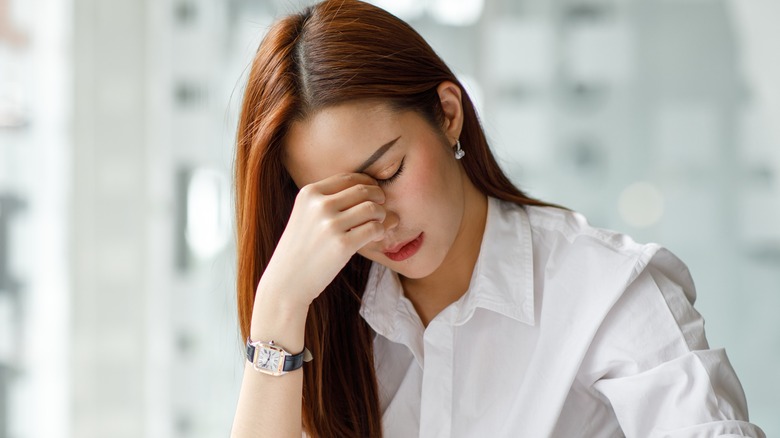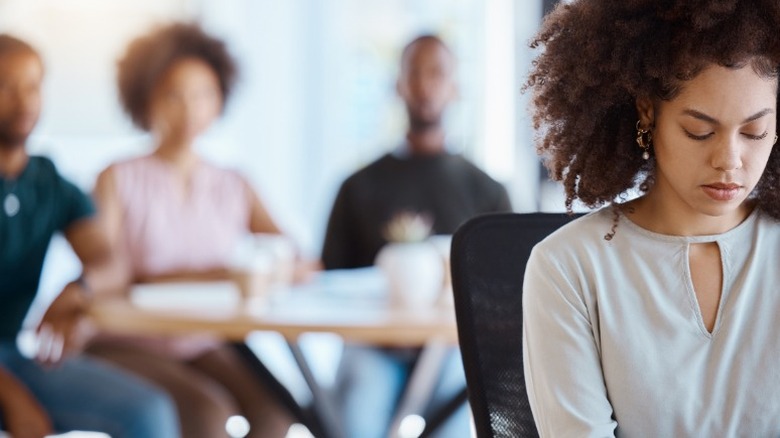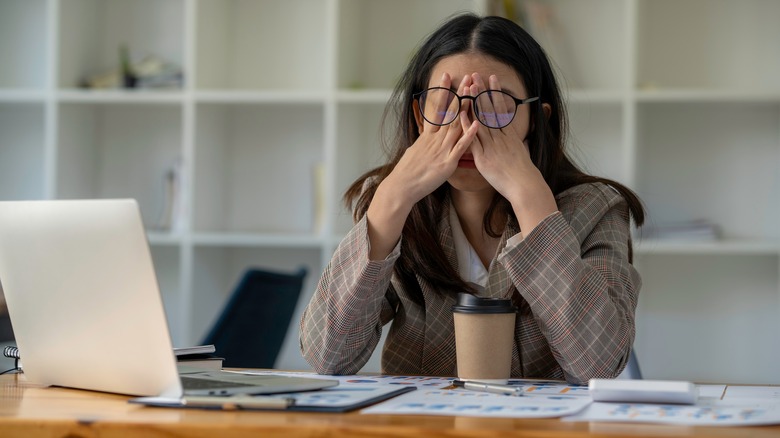Why Attractive People Are Actually More Lonely, According To Science
According to social trends, being attractive is desirable. People believe that attractive folks have a front-row ticket to life. Recently, pretty privilege has been a hot topic of conversation everywhere, including TikTok (via the New York Post). People are surprised by the kind of privileges attractive people enjoy or the kind of stuff they get away with just because they are good-looking. While "pretty privilege" or "beauty premium" is definitely a thing, life is not all that easy for attractive people.
People tend to believe that those who possess physically appealing features are generally well-liked. On television, attractive folks always seem to have an active social life and are always surrounded by friends and well-wishers. But in real life, this could not be farther from reality. Numerous studies conducted by psychologists and human behavioral experts have found that, contrary to popular belief, attractive people are actually more lonely than their less attractive peers (via the BBC). From struggling to be employed to finding suitable friends and partners, attractive people actually do have it hard.
What is pretty privilege? What is the halo effect?
Pretty privilege is the theory that people who are considered beautiful, according to conventional beauty standards, are treated better in society (via The Roots of Loneliness Project). Psychological studies even found that attractive people have an unfair advantage in certain social settings (via Psychology Today). In a courtroom, they're less likely to be judged guilty by a jury. In academic spaces, they might receive higher grades for submitting the same quality of work as other classmates. And kids who are "cuter" are less likely to be scolded or grounded by adults. Moreover, a 2014 study published in the Journal of Behavioral and Experimental Finance showed that in business spaces, like online peer-to-peer loans or real estate settings, attractive people have an unfair advantage.
The halo effect is the cognitive bias that leads to pretty privilege (via The Roots of Loneliness Project). Essentially, the halo effect is the moniker for the aspect of human behavioral psychology whereby a person exhibits one desirable quality but society automatically and subconsciously assumes them to have all the desirable qualities. Psychologists call this the "what is beautiful is good" heuristic (via the BBC). In this particular case, since someone is attractive, which is a desirable quality, we assume them to be well-educated, well-liked, have a great sense of humor, be wealthy, and so on. As mentioned before, regardless of popular assumptions, this halo effect does not necessarily help attractive people in their social lives.
In social settings, attractive people can face envy-related hostility
One study from the Journal of Personality and Social Psychology found that attractive people have a difficult time making meaningful friendships with others, especially with those of the same gender (PubMed). This happens due to feelings of envy or jealousy. In social settings, like an outing at a bar or at events like weddings or parties, a subconscious competition for attention may exist. Everybody wants to be the most memorable person in the group. As competitive beings, we like to check out our opponents.
When people are out in groups, they tend to compare themselves to the most attractive person in the group, also known as social comparison (via Psychology Today). Most people also have insecurities about their appearance or personality traits, and these unprocessed self-esteem issues can manifest as jealousy toward a particular person. This subconscious competition can lead to people distancing themselves from the attractive person. People like to protect their peace and stay away from people who remind them of their insecurities. This can also end up with people harboring negative feelings toward the attractive person. In this case of envy-related hostility, attractive people are perceived as a threat and are hence kept away.
Attractive people can face biases in the workplace, especially women
Being a pretty face has its perks at work. According to a 2014 social psychology study published in Sociology Compass (via the BBC), more attractive people have better chances of climbing the corporate ladder and, in turn, making more bucks. In the study, MBA graduates came to the conclusion that there can be up to a 15% disparity in earnings between the most and least attractive person in the group. A surprising revelation is that this income disparity can accumulate a difference of about $230,000 in wealth over a lifetime. While pretty privilege is an advantage at work, the grass is not always greener. Attractive people may run into biases fueled by jealousy when it comes to hiring.
According to a study about the anti-attractive bias in organizational decision-making, "if you are interviewed by someone of the same sex, they may be less likely to recruit you if they judge that you are more attractive than they are" (via the BBC). The psychological reason behind this is again jealousy and envy-related hostility of hiring managers toward attractive candidates. While being attractive works in the favor of men climbing the corporate ladder, attractive women face sexist prejudices that keep them from being promoted to higher-level positions that require authority (via the American Psychological Association).
Attractive people might intimidate potential dates
The general consensus in society is that attractive people have an easier time when it comes to dating and finding love. Attractive people are desired by everyone and must have a long line of suitors waiting for them, right? Apparently, this is a misconception. Being a pleasure to look at might actually make it difficult for you to land your fairytale love story, especially if you are looking for it on dating apps. According to a study conducted by Christian Rudder, co-founder of the online dating platform OKCupid, analyzing more than a decade's worth of data from people who use the website found out that you have better chances of finding "the one" from online dating platforms if you are less attractive (via the BBC).
The study asked users to rate profiles on a scale of one to five and compared the ratings to the number of messages those profiles received. Rudder, who is also a mathematician, found that people who received the most number of messages were on a mid-range in the attractiveness scale. If we look from the perspective of potential suitors, when they come across the profile of someone who is extremely attractive, they assume that they already have way too many matches to even notice them. Nobody likes to be rejected. Hence, they tend to link with people they believe they might actually have a shot at dating.
Attractive people have a higher chance of being judged at a first meeting
While the halo effect attributes attractive people to positive traits like intelligence, good hygiene, and proper manners, some negative traits are also part of the package. Attractive people tend to know they are attractive. Like the cumulative nature of favors in school, college, and workplaces leading to a disparity in wealth, the cumulative nature of compliments they have received over the years makes them confident. Confidence can be intimidating to some, and good-looking people's confidence can result in them owning the physical spaces they are in. Our cognitive biases reflect this as the person being less approachable.
According to a 2016 study, attractive people "often give off the initial impression of being self-centered, entitled incompetent and promiscuous" (via Sage Journals). The study found that while the socially desirable qualities attached to a person increased with their attractiveness level, the attribution of egocentric qualities also increased with their attractiveness level. This lead to a decrease in the number of social interactions that are initiated with highly attractive people. The study also found that moderately attractive people are the favorites when it comes to approachability.
Attractive people's success is often attributed to luck rather than their talent
Due to the real-life implications of the halo effect, society tends to perceive attractive people as less talented or hardworking than their less attractive peers. In society, we tend to assume that attractive people owe their professional or academic success to their good looks or sex appeal.
Research from the Journal of Personality found that when we judge people of the opposite gender, we perceive them as more talented than their less attractive counterparts, but when we are judging the members of our own gender, we are more likely to believe that the attractive person's success is due to their looks and not actually their talent or dedication (via Wiley Online Library). Once again, our cognitive biases may lead to making the assumption that just because a person is good-looking their work is subpar and that they are undeserving of their fortune.
In conclusion, while being attractive is still desirable and might make life easier in many ways, the unique disadvantages of being attractive are not to be neglected. From not being taken seriously in the workplace to not being able to socialize effectively, being extremely attractive can actually bring down the overall quality of your life.






